Injunctions are a legal order that most people are unlikely to ever encounter, but if they are served with one, they need legal help as soon as possible. Injunctions can happen within several scenarios but most commonly they will be used by commercial lawyers within commercial law between two companies, a company against an individual, or an individual against a company.
Injunctions are orders issued by a court that prohibits or commands a specific action, and the objective of that is to prevent another party from suffering harm. One of the most common reasons that an injunction will be sought is to maintain a certain set of circumstances or status quo. An example will be during a dispute between two parties and one of them requests an injunction to prevent the other party from changing, selling, and removing something.
Types Of Injunction
There are essentially four different types of injunction that could be ordered by a court.
Mareva Injunction
The effect of a Mareva injunction is to freeze matters specifically concerning assets, which is why is it often referred to as a ‘freezing order’. A person or party served with a Mareva injunction is ordered not to conduct any dealings concerning some or all of their assets. Common reasons include disputes over ownership and non-payments for those assets.
Prohibitory Injunction
As the name suggests, this type of injunction is designed to prevent the party served with it from taking a specific action. The type of action specified can be just about anything with examples including ex-employees being prohibited from sharing sensitive data belonging to their previous employer or an individual prohibited from entering property or land i.e. trespassing.
Mandatory Injunctions
These are the complete opposite to prohibitor injunction as instead of ordering a party not to perform a specific caption, this type of injunction orders them to perform a specific action. These tend to be most common in commercial disputes between a company and another company or an individual. An example would be an injunction ordering a company to honour a contract and pay for goods or materials supplied by another company under that contract.
Interlocutory Injunction
This injunction is designed to protect one of the parties from suffering or from being at a disadvantage should the other party perform an action. In effect, it maintains the current state of affairs until the dispute is resolved. They tend to be used where financial compensation would not be possible should one party harm the other.
Factors Considered By Courts When Consider Whether To Grant An Injunction
Injunctions are not granted by courts on a whim and there are several factors that they will consider before ordering one. These factors include:
Is There A Reasonable Case In Front Of The Court?
The court must be satisfied that the evidence it has in front of it is sufficiently in the claimant’s favour before it will grant an injunction. This also takes account of any rebuttal evidence from the other party.
Has Every Solution Been Tried To Resolve The Issue But Failed?
Claimants wanting the court to grant an injunction must show that they have made every reasonable attempt to resolve the problem with the other party but that no resolution has been achieved.
Is The Issue Not Solvable By Compensation?
The court must be satisfied that an injunction is the only option open and that even if money were offered as compensation it would not resolve it.
Is The Injunction Needed Urgently?
Time is of the essence when applying for an injunction and it is the claimant’s objective to show that any delay would cause them further harm as it would allow the other party to take actions that bring that harm into being.

